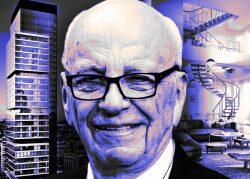A Lannister always pays his debts. But a condo developer in financial straits? Possibly not, according to a new lawsuit from construction attorney and consultant Barry LePatner.
Since 2018, LePatner has been suing Steven Kirschenbaum and Ronald Winkler, the developers of 320 West 115th Street, alleging they owe him a raft of bills for his work to get their struggling project across the finish line.
A judge has already ordered Kirschenbaum and Winkler to pay LePatner some of the money he alleges they’ve withheld. But LePatner is suing again, claiming the two haven’t paid up, even after they’ve paid themselves roughly $3 million.
The spat started in March 2018, when LePatner sued Kirschenbaum and Winkler over $640,000 in unpaid bills from his time as a project manager on their condo development at 320 West 115th Street in Harlem. The suit stalled through the pandemic, but a judge in September ordered the developers to pay LePatner about $184,000, plus $46.58 per day in interest.
The judgment only settled one of LePatner’s claims — the rest, worth about $500,000 plus interest, remain unresolved.
Kirschenbaum and Winkler’s project dates back to 2014, when they purchased two lots on 115th Street for $3.9 million.
They planned to combine and renovate the properties, developing a six-unit condo with a $12 to $16 million sellout. The project hit several roadblocks, as the construction management firm misused project money and performed shoddy work. In the fall of 2016, the developers hired LePatner to stop the bleeding and bring their condos across the finish line.
Work finished in late 2017, and by the end of the year, the developers had sold five of the six units. The final apartment went in 2018, and Kirschenbaum and Winkler reported $15.4 million in gross revenue, the suit alleges. LePatner had agreed to delay payment until closing the fourth apartment, citing cash flow issues on the project. But after the unit closed in December 2017, he never got paid.
Kirschenbaum and Winkler said in a deposition last year their development venture was insolvent, hence the delay in payment. But LePatner fired back by producing the project ledger, which shows they transferred more than $3 million of LLC assets to themselves — $937,439 to Kirschenbaum and $2.15 million to Winkler — $690,000 of which were transferred after LePatner started his lawsuit. (Winkler disputes the amount of one of the transfers. If correct, his amount would drop to $1.88 million.)
Read more


Neither partner denies the transfers, and told the court they were paying themselves back for personal loans they made to the development company. But LePatner argues the payments constitute fraud, as they were transferring project funds to company managers. He also calls into question the amount they paid themselves: they fronted about $1.9 million, according to court documents, putting interest on the payments around $1 million.
The developers say they disputed LePatner’s invoices in 2018, arguing that he misrepresented his negotiations with the construction lender, Avant. They claim LePatner told them Avant offered them an extension on the loan as the timeline dragged on, saving them from default and default interest. As a result, they say, they chose not to refinance as the development came together.
“The default interest blindsided us, just when they knew the work was complete, TCOs were in hand and closings were to begin,” they wrote in an email to LePatner. “It’s as if we ran 50 yards in an open field to the goal line and spiked the ball on the 1 yard line only to have the lender recover the fumble.”
They also say LePatner failed to secure a permit the day before sewer and gas hookups were set to be connected, delaying the project. LePatner disputes all the claims and declined to comment through his attorney, Jason A. Stern.
Kirschenbaum was the chief operating officer of Swig Equities for nearly 13 years. Thomas Mollaney, the attorney representing the former executive and Winkler, didn’t respond to a request for comment.
